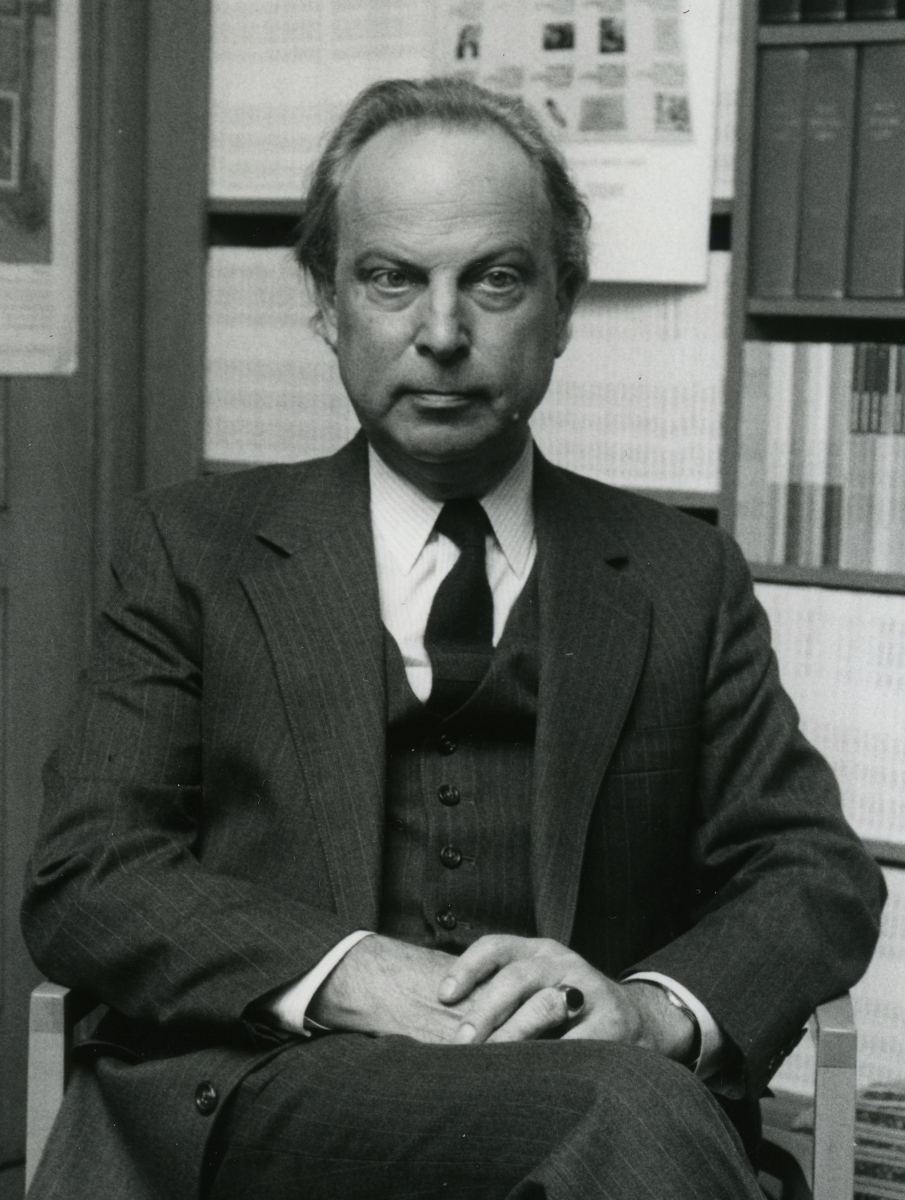
Ivar Ivask
Ivar Vidrik Ivask (17. XII 1927 – 23. IX 1992) was an Estonian poet, essayist, literary scholar and critic, as well as an artist, one of the most distinguished literary figures in exile.
He was born in Riga to a Latvian father and an Estonian mother; his home language was German. He married a Latvian, Astrīde Hartmane (who became Astrīde Ivaska). His emotional ties to Estonia stemmed mostly from his childhood summers at Rōngu. Ivar Ivask studied at Estonian-, Latvian- and German-language schools in Riga. In 1944 he escaped with his father from the war to Germany, where he studied firstly at the Estonian Gymnasium in Wiesbaden, and then German studies, comparative literature and art history at the University of Marburg (1946-1949). After that he settled in the United States of America. After his retirement from his university career he and his wife moved to the village of Fountainstown in Ireland, where he died. His remains are buried in Rōngu cemetery.
In 1953 Ivask defended his doctoral thesis on Hugo von Hofmannsthal at the University of Minnesota. He worked at St. Olaf’s College, Northfield, Minnesota, as a lecturer in German language and literature (1953-1966) and as a professor at the University of Oklahoma (1967-1991). His field of research was primarily German literature, as well as world literature and comparative literature.
While at the University of Oklahoma he became the editor-in-chief of the journal World Literature Today (previously Books Abroad). Through him, and by him, more than 300 critical articles about Estonian works of literature appeared in its pages, as well as articles on Estonian literature.
He belonged to the Estonian Writers’ Union Abroad, the Estonian PEN Club, the Wellesto group, as well as several foreign writers’ organizations. He was one of the founders of the Associations for the Advancement of Baltic Studies (AABS) and its president in 1979-1980.
In 1974 he won the Henrik Visnapuu Literature Prize for his collection Oktoober Oklahomas (‘October in Oklahoma’); in 1975 he won the Estonian Cultural Foundation (USA) prize; and in 1983 he became a Commander of the Order of the Lion of Finland, for promoting Finnish literature in the international arena.
Collections of his poetry and of his articles have been published.
Ivask’s poetry, which is an expression of his identity, is intellectual but sincere, philosophical, meditative, and engaged with nature and culture. His poetic creation began with free verse in German (the collection Gespiegelte Erde, New York 1967), modelled on Rainer Maria Rilke. Thereafter he transferred to writing in Estonian. One leading motif of his poetry is the “veranda” of his remembered Rōngu, but he was also influenced by his travels in Europe, including his emotional response to Finland. He illustrated his own and his wife’s poetry collections, and subsequently his art (drawings, collages) was collected for exhibition.
In exile he wrote in Estonian, German and English.
He compiled and wrote an introduction to Bernard Kangro’s poetry collection Ajatu mälestus (‘Timeless memory’, 1960) and edited the texts of other exiled writers, such as Ivar Grünthal’s 1964 multilingual poetry collection, as well as the proceedings of the first congress of Baltic studies in Maryland in 1968.
In addition to the theme of Estonian literature, he published studies and reviews of Austrian, German, Spanish, Latvian and Lithuanian literature, collaborated on encyclopaedias, as well as monographs and edited collections. At his initiative the Neustadt international prize for literature was established, as well as the series of Puterbaugh literature conferences.
M. K. (Translated by C. M.)
Books in Estonian
Poems
Tähtede tähendus. Lund: Eesti Kirjanike Kooperatiiv, 1964, 71 lk.
Päev astub kukesammul. Lund: Eesti Kirjanike Kooperatiiv, 1966, 88 lk.
Ajaloo aiad. Lund: Eesti Kirjanike Kooperatiiv, 1970, 108 lk.
Oktoober Oklahomas. Lund: Eesti Kirjanike Kooperatiiv, 1973, 112 lk.
Verikivi. Lund: Eesti Kirjanike Kooperatiiv, 1976, 86 lk.
Elukogu. Lund: Eesti Kirjanike Kooperatiiv, 1978, 319 lk.
Verandaraamat. Lund: Eesti Kirjanike Kooperatiiv, 1981, 72 lk;
Tänusõnu. Lund: Eesti Kirjanike Kooperatiiv, 1987, 72 lk.
Verandaraamat ja teisi luuletusi. Tallinn: Eesti Raamat, 1990, 455 lk. [Valikkogu.]
Astride ja Ivask, Rändav järv: Valitud luuletused. Koostanud ja toimetanud Livia Viitol; tõlkinud Ivar Ivask, Viiu Härm, Ita Saks, Marie Under ja Livia Viitol; eessõna: Anna Žigure. Tallinn: Eesti Keele Sihtasutus, 2002, 94 lk.
Essays, articles, correspondence
Akadeemia kirjades. Ants Orase ja Ivar Ivaski kirjavahetus 1957–1981. Koostanud ja saatesõna: Sirje Olesk. Tartu: Eesti Kirjandusmuuseum, 1997, 379 lk.
Tähtede tähendust tunda. Koostanud ja saatesõna Jüri Talvet. Tartu: Ilmamaa, 2003, 568 lk. [Sari ‘Eesti mõttelugu’.]
Olla need, kes me oleme. Katkeid päevikutest aastatel 1964-1992. Koostanud ja kommenteerinud Sirje Olesk. Tartu: Eesti Kirjandusmuuseum, 2007, 139 lk.
Hetked igavikust. Meelisklusi maailma kirjanduselust. Koostanud ja saatesõna Jüri Talvet. Tartu: Ilmamaa, 2010, 384 lk.
About Ivar Ivask
Ivar Ivaski personaalbibliograafia. Koostanud Mari Tarvas. Tallinn: Keel ja Kirjandus, 2006, 120 lk.



